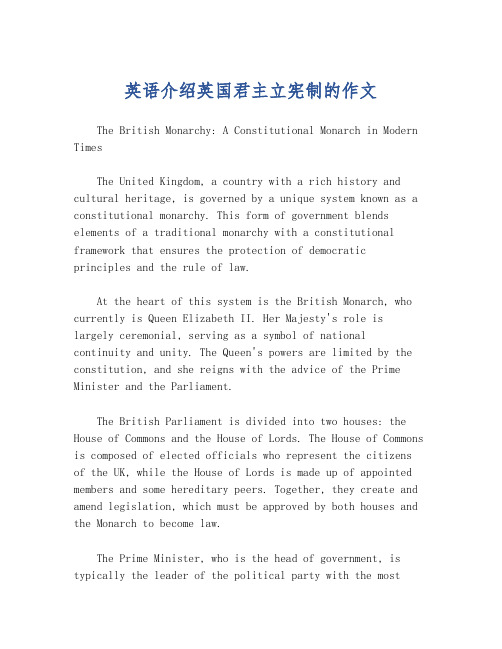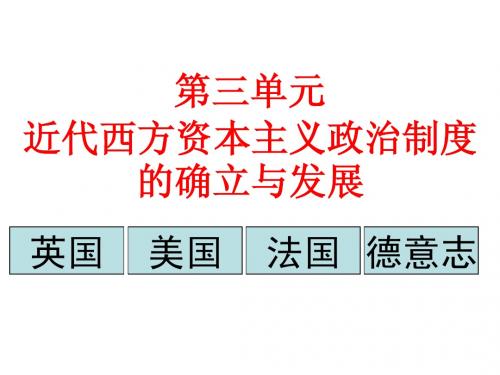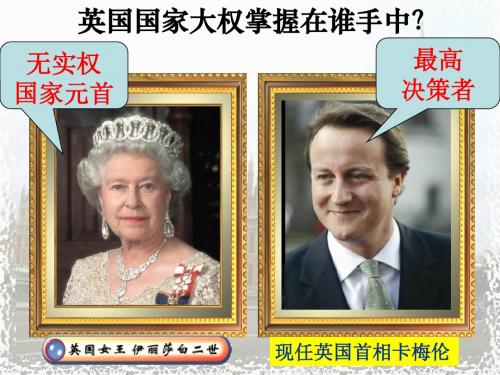英国君主立宪制--British Constitutional Monarchy
中学历史 英国君主立宪制的建立 课件

探究:国王查理一世因何而死?
1215年约翰王与贵族签订《大宪章》
第12条:无全国公意许可,不得征收任何免役与贡金。
第61条:由二十五名贵族组成的委员会有权否决国王 命令。
英国君主立宪制的建立
The Establishment of British Constitutional Monarchy
什么是君主立宪制?
君主立宪制
君主制定法律
以世袭的君主为国家元首,君主权力按法律规定受到一定 限制的政权组织形式
“王在法下”
英
英
国 女
VS
国 议
王
会
“国王之死”
探究:国王查理一世因何而死?
⑴凡未经议会同意,以国王权威停止法律或停止法 律实施……为非法行为。
立法权
⑵凡未经议会准许,借口国王特权……而征收金 钱……为非法。
财政权
⑶设立审理宗教事务之钦差法庭之指令,以及一切 其他同类指令与法庭,皆为非法。
⑷除经议会同意之外,平时在本王国内征募或维持 常备军,皆属违法。
⑸议会议员之选举应是自由的。
“王在法下” “议会的国王”
以议会为中心的君主立宪制确立起来
“内阁”英文 “ cabinet ” 原 意 为密室,早期是 国王与顾问和助 手开会的地方。
责任内阁制的形成
“不懂英语的国王” 1714年安妮女王去世后,无嗣继承,德国远亲乔治一 世入主英国,但他不熟悉英语,对英国事务也不关心。掌 控行政大权的内阁会议逐渐由国王主持转向由财政大臣主 持。1721—1742年,政府工作由罗伯特•沃波尔主持,实 际上成为英国的第一任首相。
2017年高考历史高频考点:英国君主立宪制

[键入文字]2017 年高考历史高频考点:英国君主立宪制历史网的小编给各位考生整理了2017 年高考历史高频考点:英国君主立宪制,希望对大家有所帮助。
更多的资讯请持续关注历史网。
▲高考历史高频考点:英国君主立宪制君主立宪制(英语:Constitutional monarchy),亦即“有限君主制”,是相对于君主专制的一种国家体制。
君主立宪是在保留君主制的前提下,通过立宪,树立人民主权、限制君主权力、实现事务上的共和主义理想但不采共和政体。
可分为二元制君主立宪制、议会制君主立宪制。
君主虽然是国家的元首,但君主的权利与产生的方式,会依各个国家的制度而不同;纵使是同一个国家,往往在不同时期,君主的产生方式与权利范围也各不相同。
英国的”光荣革命“为君主立宪制国家开启了先例。
一般君主是终身制的,君主的地位从定义上就已经高于国家的其他公民(这是君主与一些其他元首如独裁者的一个区别),往往君主属于一个特别的阶层(贵族),此外世袭制也往往是君主的一个特点。
英国资产阶级革命确立的君主立宪政体大大削弱了国王的权力,议会及政府逐步掌握了治理国家的权力,这种政治体制虽然有其历史局限性,但它结束了英国的封建专制制度,使得英国走上资产阶级政治民主化的道路,有利于资本主义的发展。
它代表了历史发展的趋势,是历史的一大进步。
英国是世界上第一个建立君主立宪制的国家,这一制度的确立和不断完善,不仅对巩固资产阶级在英国的统治起了巨大的作用,而且对其他国家的资产阶级建立新的制度,也有着巨大影响。
▲高考历史高频考点:英国君主立宪制确立的过程君主立宪制度的形成和发展过程较复杂,基于时间发展的线索图说明比较清晰.它起源于13 世纪的《大宪章》和议会制度,17 世纪《权利法案》颁布最终确立了议会主权,君主立宪制初步确立。
1。
英语介绍英国君主立宪制的作文

英语介绍英国君主立宪制的作文The British Monarchy: A Constitutional Monarch in Modern TimesThe United Kingdom, a country with a rich history and cultural heritage, is governed by a unique system known as a constitutional monarchy. This form of government blends elements of a traditional monarchy with a constitutional framework that ensures the protection of democraticprinciples and the rule of law.At the heart of this system is the British Monarch, who currently is Queen Elizabeth II. Her Majesty's role islargely ceremonial, serving as a symbol of nationalcontinuity and unity. The Queen's powers are limited by the constitution, and she reigns with the advice of the Prime Minister and the Parliament.The British Parliament is divided into two houses: the House of Commons and the House of Lords. The House of Commons is composed of elected officials who represent the citizens of the UK, while the House of Lords is made up of appointed members and some hereditary peers. Together, they create and amend legislation, which must be approved by both houses and the Monarch to become law.The Prime Minister, who is the head of government, is typically the leader of the political party with the mostseats in the House of Commons. The Prime Minister is responsible for running the country on a day-to-day basis and has significant influence over the direction of national policy.The constitutional monarchy has evolved over time, with the powers of the Monarch being gradually reduced as the role of Parliament has increased. This shift has been facilitated by various constitutional documents and legal precedents, which have established the supremacy of Parliament and the principles of responsible government.One of the key advantages of the constitutional monarchy is its ability to provide stability and continuity. The Monarch serves as a non-political figurehead, allowing for a sense of continuity even as governments change. Additionally, the Monarch plays a role in national ceremonies and the recognition of achievements by citizens, fostering a sense of national identity and pride.However, the system is not without its critics. Some argue that the Monarchy is an outdated institution that perpetuates class divisions and does not represent the values of modern democracy. Others contend that the Monarchy is a vital part of Britain's cultural identity and that it provides a sense of history and tradition that is important to the nation's psyche.In conclusion, the British constitutional monarchy is a complex and fascinating system that has adapted to the changing political landscape over centuries. It represents abalance between tradition and modernity, offering a unique blend of stability and democratic governance that is central to the identity and functioning of the United Kingdom.。
第7课 英国君主立宪制的建立

英国首相布莱尔27日在最后一次前往议会 英国首相布莱尔 日在最后一次前往议会 接 受议员提问之后 向英国女王 之后, 女王伊丽莎白二世正式递 受议员提问之后,向英国女王伊丽莎白二世正式递 交辞呈,从而宣告结束自己长达10年的首相生涯 年的首相生涯。 交辞呈,从而宣告结束自己长达 年的首相生涯。 英国执政党工党新任领袖布朗27 执政党工党新任领袖布朗27日下午应英 英国执政党工党新任领袖布朗27日下午应英 女王伊丽莎白二世的邀请前往白金汉宫 伊丽莎白二世的邀请前往白金汉宫, 国女王伊丽莎白二世的邀请前往白金汉宫,接受女 王授权组建新一届内阁,并从女王手中接受御玺, 王授权组建新一届内阁,并从女王手中接受御玺, 内阁 正式就任英国首相。 正式就任英国首相。
第三单元 近代西方资本主义政治制度 的确立与发展 英国 美国 法国 德意志
英国国家大权掌握在谁手中? 英国国家大权掌握在谁手中?
无实权 国家元首 最高 决策者
第 7 课 英国君主立宪制的建立
Constitutional Monarchy System in England 宪法的 君主制
概念 君主立宪制:是指资本主义国 是指资本主义国
议会权力
责任制内阁的形成( 责任制内阁的形成(Cabinet) ——英国君主立宪制下的国家政权组织形式 英国君主立宪制下的国家政权组织形式 英国君主立宪制下的
内阁的起源: ⑴内阁的起源: 内阁的形成: ⑵内阁的形成:
英国第一任 首相
沃尔波尔 布朗
⑶内阁的运作: 内阁的运作: 运作
英国现任 首相
三、完善:责任内阁制的形成 完善:
背景----资产阶级革命和光荣革命 ----资产阶级革命和 一、背景----资产阶级革命和光荣革命 议会 1、根本原因 资本主义经济迅速发展 资产阶级和新贵族形成 斯图亚特王朝的专制统治
7课英国君主立宪制

活学活用
每日经济新闻报道:金融危机愈演愈烈,英伦三岛早 已是深陷泥潭。英国财政大臣达林10月8日上午宣布了一 揽子银行救助计划,英国政府将向英国各大商业银行注入 高达500亿英镑 (880亿美元)的资金。甚至准备将中小 银行国有化。你认为: ◆ 内阁成员大体上是赞成还是反对?为什么? 赞同。集体负责,共同进退。 ◆ 女王伊丽莎白二世如果反对,布朗首相会不会为此 改变策略,为什么? 不会。首相掌握行政大权,不对国王负责。 ◆ 如果议会中大多数都极力反对,结果又会如何? 议会可以通过对政府的不信任案,要求内阁下台; 内阁要么下台,要么宣布解散议会,重新选举。
光 荣 革 命 1688年 完 成
革命爆发 1640年
1660年 斯图亚特王朝 复辟 时间
• 1、“它是一场没有流血的戏剧,不具有革命性 质,麦考来的《英国史》称它是”理想的、合法 的、典范的革命“。这场革命的实质是( ) • A 封建政权内部的争夺政权的斗争 • B 资产阶级与封建势力妥协的斗争 • C 资产阶级内部的争夺政权的斗争 • D 封建国王与克伦威尔争夺政权的斗争
英国国家大权掌握在谁手中?
无实权 国家元首 最高 决策者
现任英国首相卡梅伦 前英国首相布朗
第 7 课 英国君主立宪制的建立
Constitutional Monarchy System in England 宪法的
君主立宪制含义:
君主制
国家的一切是由法律来决定的,君主无实权, 而且本身也要遵循法律。
小结
一条主线:英国君主立宪制的确立、发展、完善 过程 两大趋势: 国王权力不断削弱 议会权力不断增强 三个转移:立法权、财政权等从国王转移到议会 (《权利法案》) 行政权从国王手里转移到内阁 (责任内阁制确立) 民主权利转移:议会改革 (贵族民主→工业资产阶级民主→公民民主)
原创5:第7课 英国君主立宪制的建立

内阁的原意为密室, 早期是国王与顾问 和助手开会的地方。 后逐渐成为国王直 辖的最高行政机关。
阁承担实际行政职责。
2.责任内阁制的基本原则
(1)内阁实行集体负责制,与首相在政治上共进退。 (2)内阁失去下院信任时,应该全体辞职或者通过国 王解散下院,重新大选。 (3)大选中获胜的多数党上台组阁,多数党领袖为当 时的内阁首相,负责挑选内阁成员并拥有免职权。
内阁首相地位提高,负责协调各部门的工作,内阁处理国 家事务的权力增强。
19世纪中期,选举权的扩大和两党制的发展对内阁制的发 展产生了重大的影响,政党内阁形成。
1.内阁制形成
1714年即位的乔治一世出生于德国,
不懂英语,对英国的事务也不感兴 趣,甚至不出席内阁会议而让大臣 们去料理国事。大臣们有事就自己 先商定对策,然后再提交国王,内 阁制由此得以形成。国王也就逐渐 成为“统而不治”的国家元首。内
第三单元 近代西方资本主义政治制度 的确立与发展
第7课 英国君主立宪制的建立
君主立宪政体 英译:constitutional monarchy 君主立宪制,又称立宪君主制,是指在宪政体制下由一 个世袭或选出的君主作为元首的政体。君主立宪政体下 君主不再享有专制政体下的无限权力,其权力受到宪法 和议会限制。
比较探究:明朝废除丞相,皇帝君临天下,直接处理国家大 事,设殿阁大学士辅政,后逐渐演变为内阁,成为与六部并行 的国家行政机关,内阁的最高长官称“首辅”。 1721年,罗伯特•沃尔波尔成为英国历史上第一任内阁首相, 英国的内阁制形成。
同样是内阁,两者一样吗?
尽管称呼一致,但阶级本质完全不一样。 明朝 “内阁”是专制王权的辅政机构,内阁成员由皇帝任命, 是封建专制主义的产物。 而英国内阁是政府的执政机构,以代议制民主为基础,内阁产生 是由议会选举中获胜的多数党上台组阁而成,是资产阶级民主 政治的产物。
第7课 (说课)英国君主立宪制的建立
第 7 课 英国君主立宪制的建立
The Establishment of Constitutional Monarchy System in England
他们究竟是谁在统治英国?
英王扮演的角色
英国女王的头衔 全称是“天佑大 不列颠及北爱尔 兰联合王国和她 的其他领土及领 地的女王、英联 邦元首、基督教 护教者伊丽莎白 二世”
二、议会权力的确立
(政治权力从英王向议会转移)
1、《权利法案》的颁布(1689年)
内容 作用 标志限制了国王 哪些权利?
• 凡未经议会同意,以国王权威停止法律或停止实施之 立法权 僭越权力,为非法权力。 • 凡未经议会准许,借口国王特权,为国王而征收,或 供国王使用而征收金钱,超出议会准许之时限或方式 征税权 者,皆为非法。 • 设立审理宗教事务之钦差法庭之指令,以及一切其他 司法权 同类指令与法庭,皆为非法而有害。 • 除经议会同意外,平时在本王国内征募或维持常备军 ,皆属违法。 军事权
• 英王是国家元首,在对外交往中代表英国 • 英王是国家的人格化,成为民族团结的纽带和国家统一的象征 • 英王作为英联邦首脑,还起着维系英联邦的纽带作用
一、光荣革命(1688年)
------英国资产阶级革命结束的标志
1、英国资产阶级革命的原因 (1)经济基础:资本主义已有较大发展 (2)阶级基础:出现新兴资产阶级和新贵族 (3)斯图亚特王朝专制统治严重阻碍资本主义 发展(根本原因) 2、经过: 爆发1640年——共和国——复辟——“光荣革命 ” 确立君主立宪制 3、成果:
下院
选 举
议会 (立法权)
上院
(贵族世袭)
选
民
英国政治制度
英国的君主立宪制
• 议会制君主立宪制, 简称议会君主制。其 主要特点是:议会不 仅是国家的最高立法 机关,而且是最高国 家权力机关,由议会 选举产生的政府首脑 组织政府,是真正的 国家权力中心。君主 是象征性的国家元首, 其职责多是礼仪性的。
英国议会制度
•
议会是英国政治的中心舞台,是英国的最高立法机关。政府从议会中产生,并对其负 责。英国的国会为两院制,由上议院和下议院组成。 上议院又称贵族院,主要由王室 后裔、世袭贵族、新封贵族、上诉法院法官和教会的重要人物组成。上议院议员不由 选举产生,部分是世袭贵族。上议院是英国最高司法机关,议长由大法官兼任。和下 议院相比,上议院的权力相对有限,保留着历史上遗留下来的司法权,有权审查下议 院通过的法案,并通过必要的修正案,还可以要求推迟它不赞成的立法,最长可达一 年。下议院又称平民院或众议院,其议员由直接选举产生,任期5年。下院的主要职权 是立法、监督财政和政府。
工党
• 工党成立于1900年2月,是英国的主要政党之一,由工会、合作社组 织和社会主义团体联合组成。前身是全国性统一组织——职工大会 (工联),1900年成立“工人代表委员会”并推选出自己的党选候选人, 1906年正式改名为“工党”。其建党目的是让劳工阶层在政治上也 有发言权。 • 英国工党(LabourParty,GreatBritain)英国两大执政党之一。 • 工党同工会之间始终保持着特殊关系。经费主要来自工会的捐助,绝 大部分党员是工会会员。多年来工党党员人数一直处于600~700万之 间,其中个人党员约60~70万。 • 英国历史上著名首相 工党代表人物——托尼· 布莱尔:托尼· 布莱尔是 工党历史上在任最长的英国首相( 1997年至2007 ),也是该党唯一 一位带领工党连续3次赢得大选的首相。
why Constitutional monarchy was established in UK
The reasons of British constitutional monarchy 君主立宪制出现的原因
Political traditions
In 1295, Edward II formally established Parliament the contradiction between capitalist economy and absolute monarchy In 1295, Edward II formally established Parliament,which marked the beginning and development of the restrictions on crown's power. Parliament was reserved during the process of British development. Parliament's power has steadily increased while the Crown's has steadily declined,breaking the balanced relationship.It founded the base for The British bourgeois revolution.
the limit of royal power
In 1215,King John was forced to sign the Magna Carta.The Magna Carta aim to limit royal power. In British history,monarchy had been advancing while being constrained,both the king and nobility have certain rights and obligations to maintain a balanced relationship. it was the most significant early influence on the extensive historical process that led to the rule of 6 constitutional law.
英国政治制度
英国政治制度英国是一个单一制、君主立宪的民主国家,它的政府体系(即所谓西敏制)直接影响了许多其他国家的政治体制,包括加拿大、印度、澳大利亚和牙买加等英联邦成员国。
英国没有成文的宪法,但宪法惯例(constitutional conventions)具有宪法的作用;各种成文法和普通法共同组成了所谓的英国宪法。
英国的国家元首和理论上最高权力的拥有者是英国君主.基本信息•中文名:英国政治制度•国家:英国•代表:宪法•机构设置:政府机构组成正在加载英国国徽英国是一个单一制、君主立宪的民主国家,它的政府体系(即所谓西敏制)直接影响了许多其他国家的政治体制,包括加拿大、印度、澳大利亚和牙买加等英联邦成员国。
英国没有成文的宪法,但宪法惯例(constitutional conventions)具有宪法的作用;各种成文法和普通法共同组成了所谓的英国宪法。
英国的国家元首和理论上最高权力的拥有者是英国君主,目前为伊丽莎白二世。
实际上,女王只拥有象征性的地位,其权力的形式受到惯例与民意的约束。
但是君主基本上还是可以行使三个重要的权利:被咨询的权利、提供意见的权利和警告的权利。
一个君主在位的时间越长,经验与学识越丰富,他的意见就越会受到内阁和首相本人的重视,而这种君主与内阁之间的交流是在每周例行的秘密会议中进行的。
事实上在英国,拥有最高政治权力的人是内阁首相(现任首相大卫·卡梅伦; zh-hant大卫·卡麦隆于2010年5月11日起执政),他必须得到下议院的支持。
'君临国会'(Crown in Parliament)代表了英国的国家主权。
机构设置政府英国政府正式名称为'女王陛下政府'或'国王陛下政府'(取决于在位君主),负责英国的行政功能。
首相为政府首脑,由英国君主任命,但是依惯例此人必须是下议院中最有可能获得下议院支持的议员。
首相获任命后再挑选其他部长和行政首脑,组成政府。
- 1、下载文档前请自行甄别文档内容的完整性,平台不提供额外的编辑、内容补充、找答案等附加服务。
- 2、"仅部分预览"的文档,不可在线预览部分如存在完整性等问题,可反馈申请退款(可完整预览的文档不适用该条件!)。
- 3、如文档侵犯您的权益,请联系客服反馈,我们会尽快为您处理(人工客服工作时间:9:00-18:30)。
Rule 1:
Rule 2:
if parliament pass the government's mistrust case, the cabinet is going to pot;The prime minister don't have to resign, but have to submit to the king to dissolve the parliament for a new one.
原则2: 如果议会通过了对政府的不信任案,内阁 就要垮台;首相也可不辞职,提请国王解散议会, 重新选举。
16
Get on the same things all the time, you are the expert 重复的事用心做,你就是专家
©东区邮电局商函分局直邮团队
Not afraid to do difficult thing, you are Mr Obama 困难的事不怕做,你就是奥巴马
《 Bill of right 》
《权利法案》
Article8
Free elections the parliamentary election should be free.
the freedom of speech、debate and the discussion in Freedom of speech the parliament should not be... be impeached or inquiried
election
election
with the foundation of representative ,the parliament and the cabinet as the core,the Constitutional Monarchy contain the monarchy、Aristocratic system and democracy 。
02
The revolution in the 17th century
The battle in the 13th century 13世纪的斗争 In 1215, King John was forced to sign the " Magna Carta " 英王约翰签署《自由大宪章》
" Magna Carta " King John
British citizen at least 18 years of age have the right to participate in the lower house election
13
The evolution of party system
政党制度的演变
Whigs
the liberal party the labour party
election
The parliament ( legislative power )
The upper House
( judicial power )
people
11
Complement of democracy 完善民主
01
The expansion of the right to be voted as the parliament representative议会选举权的扩大 The evolution of party system 政党制度的演变 The formation of responsibility cabinet system 责任内阁制的形成
02 03
The expansion of the right to vote as the parliament representative 议会选举权的扩大
Ohly the adult males with a certain real estate
in 1689 in 1830 in 1832 in 1918 in 1969
Tories
the conservative party
14
The formation of responsibility cabinet system 责任内阁制的形成
"The king who don't understand English "
In 1714, when queen Anne died with no heirs , George I ,one of distant relatives in Germany, became the king of England, but he is Robert Walpole came to In 1721, not familiar with English,neither care about the British affairs. Gradually, the cabinet meeting power ,representing that the was under the controlled of finance minister instand of the responsible cabinet woll Bohr become into king . In 1721-1742, Robert system came the first prime minister existence. of Britain and take up the work in the government .
The revolution in the 17th century 17世纪的革命
The parliament decided the king's fate !
The "glorious revolution" marks the British bourgeois revolution victory. Charles I James ii William iii
Article9
Article13
congress should rally frequently,to redress an injustice Timing rally and to modify、strengthen and keep the law.
《 Bill of right 》
《权利法案》
Article1
Article4
without the parliament 's permission, any behaviors of Financial rights Levying taxes in the name of the king、for the king and others Is illegal.
Establishment of democracy 建立民主
《 Bill of right 》《权利法案》
The expansion of the right to be voted as the parliament representative
Complement of democracy 完善民主
Establishment of democracy 建立民主
《 Bill of right 》《权利法案》
《 Bill of right 》
《权利法案》
Legislative power without the parliament's agreement,the king's behaviors of stopping the law or arrogating powers is illegal.
17
2013-12-25
are eligible to be elected as a Member
Less than 10% of the adult male have the right to vote
Emerging industrial assets class access to the parliament Women over the age of 30 who hold a certain property have universal suffrage
- come fromYanZhaoXiang《 the British political system history 》
15
The formation of responsibility cabinet system
责任内阁制的形成
all the cabinet members take up the responsibility collectively,keep consistent in the fundamental policy , and be with the prime minister in total
10
The main structure
(Executive power )
(The national symbol )
formally appointed compose
The cabinet
responsible to
The king
appoint
( the noble)
The lower house
Article6
except for the parliament 's permission,any other activities Military power of enlistment or maintaining a standing army, all belong to illegal.
Parliamentary sovereignty
